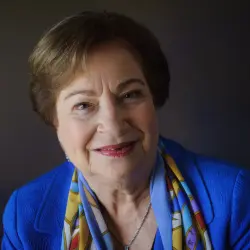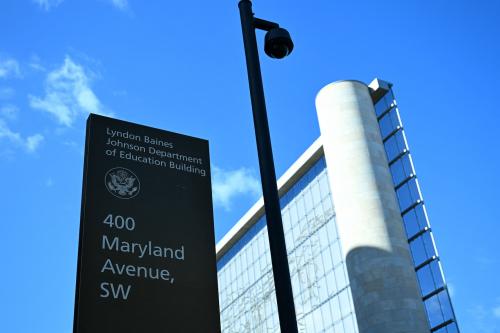

10:00 am EST - 11:00 am EST
Past Event
On March 2, 2022, six days after the start of the full-scale Russian invasion of Ukraine, a panel of Brookings Center on the United States and Europe (CUSE) experts discussed the war, its geopolitical context, strategic calculations in Europe, and possible paths forward. Moderated by Thomas Wright, the panel included Pavel Baev, James Goldgeier, Steven Pifer, Douglas Rediker, Constanze Stelzenmüller, and Angela Stent.
Wright began the conversation by asking Pifer to describe the Ukrainian reaction to the invasion. Pifer spoke of the resilience of the Ukrainian people despite Russian President Vladimir Putin’s attempts to demoralize Ukrainian civilians, including through the annexation of Crimea and the years-long conflict in the Donbas. Putin’s efforts have “actually created a strong sense of national identity in Ukraine, and he’s imbued it with a strong anti-Russian sentiment,” he argued, an attitude the war is only exacerbating.
Pifer explained that although Ukrainian President Volodymyr Zelenskyy has hinted at the possibility of agreeing to neutrality guarantees in negotiations, there is a very low chance such an agreement will be made. For Pifer, it would be difficult for the Ukrainians to win the war, but there would be no clear victory for Russia either: any pro-Russian government installed in Ukraine would “last two minutes” if the Russian military were to leave, and the Russian military is not prepared to endure a lengthy occupation.
The discussion then moved to Putin’s mindset. Stent recounted that, “shortly after [Putin] was named prime minister, he launched the second war in Chechnya… [and the Russians] leveled Grozny, the capital of Chechnya.” Based on Putin’s previous actions, Stent argued that it was reasonable to expect similar tactics to be taken against the Ukrainians. She stressed that Putin’s tactics going forward in Ukraine could — and most likely would — become more brutal. She also recognized that the Ukrainian people were not the only ones resisting Putin; thousands of Russians were protesting despite repression. On March 1, 2022, Russian authorities shut down the last remaining independent radio station, Echo of Moscow, as well as any form of dissemination of information over the war in Ukraine. Stent also addressed Putin’s threat to utilize nuclear weapons, which she called a familiar page from the “Putin playbook.” Baev would later echo Stent’s argument that Putin’s use of nukes is “pretty much a hollow bluff.”
Baev discussed the current military situation in Ukraine, stressing that “this war never had a chance to go according to plan.” U.S. intelligence exposed Russian plans from the beginning, including the concentration of Russian forces and the main direction their assaults would take. Moving forward, Baev highlighted “[t]wo crucial points in this aggression… Kyiv and Kharkiv.” Both cities, however, find themselves in different situations. Kyiv is too large and the Russians do not have the capacity to surround it. Although the Russian supply line spans miles, it has been stuck and of no help in taking Kyiv. Kharkiv’s predicament is different: it is “much closer to the Russian border, much more exposed [and it is…] much more difficult to bring [the] Ukrainian reinforcements there…Western weapons.”
Stelzenmüller focused on the impact of the war on European countries, specifically Germany. “The Eastern European economies are profoundly integrated” with Germany, she argued. “We also pushed out all of our security problems from what used to be the inner German border to Eastern Europe’s periphery,” she continued, “from the Baltic Sea to the Black Sea.” Stelzenmüller also explained that Germany faces “an uphill battle against [other Germans] who found it very convenient to outsource security to America, energy to Russia, and export income to China.” In an effort to address this security dependence, German Chancellor Olaf Scholz announced on February 27 an increase in the German defense budget from 47 billion euros in 2021 to 100 billion euros in 2022.
Rediker spoke about how the West has gone for the “nuclear option” of sanctions including on Russia’s central bank following the invasion. Using sanctions as a deterrent did not succeed, so they are now functioning as punishment. Rediker continued by stating that he does not “…see a scenario in which there’s a negotiated outcome in which some of the sanctions, whether they are against the central bank [or] individuals [are lifted].”
Finally, Wright asked Goldgeier whether the West finds itself in another Cold War. Goldgeier explained that the North Atlantic Treaty Organization (NATO) is only as united as it is today because of Putin’s 2014 invasion of Ukraine and his 2022 full-blown expansion of the war, which consolidated a sense of purpose among members. As for what might come next, he highlighted Sweden and Finland’s growing interest in NATO membership.
Panelist




July 15, 2025

Robert Kim, Derek Black, Suzanne Eckes, Preston Green III, Rachel M. Perera
July 15, 2025

Nora Gordon
July 15, 2025